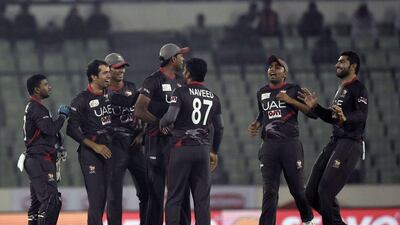DHAKA // Being under a skied catch can be a nerve-racking experience in an empty ground with only your mates as opposition.
Safe to assume, then, that having a live audience of 20,000, all supporting the other team, as well as a televised one in the millions, only serves to exacerbate it.
It is the sort of thing that might cause nervous fielders to have a restless sleep the night before the game, especially if they were about to make their first appearance on the big stage.
Luckily, Fahad Tariq had two things in his favour ahead of his Asia Cup debut for UAE against the host nation in Bangladesh’s capital at the weekend.
See also:
UAE happy with the Asia Cup experience as they get set to face Pakistan - video
Asia Cup: Amjad and UAE prepare for Pakistan and feel ‘we should do well against them’
Defeat to Bangladesh leaves UAE with mission improbable at Asia Cup as India and Pakistan await
Firstly, he is a confident and adept fielder who wants the ball to come to him anyway. And, secondly, he did not think he was going to be playing in the first place.
The Sharjah-born all-rounder was given 30 minutes notice by Aaqib Javed, the coach, after Qadeer Ahmed, who was originally listed in the starting team, was injured in the warm-up.
“I didn’t see it happen,” Tariq, 26, said of Qadeer’s injury. “I was doing a fielding session with Paul [Franks, the assistant coach] and Aaqib was like, ‘You’re playing, you’re in the XI’. I was happy for that.”
Given that Tariq had expected to be back doing his duties in Dubai as a mall operations executive for Nakheel by now, the whole experience must feel surreal.
All of the UAE players were forced to ask their employers for extended leave after they dominated the qualifying tournament last week to make it to this point.
Tariq was on the bench for the three qualifying matches, as well as the opener of the main competition against Sri Lanka.
When he was called in as emergency cover for Qadeer at the final moment against Bangladesh, he had little time to fret.
Not like when three steepling catches got hoisted in his direction. Before the match, when UAE were doing high catching drills in front of the most populated stand at the National Stadium, the home supporters were creating a cacophony each time one was shelled.
Along with Ahmed Raza and Rohan Mustafa, Tariq is one of the best regarded fielders in the UAE squad. As such, he tends to be positioned in the action areas where Amjad Javed, the captain, feels the catches might go.
The faith invested in him was well-placed. He held on to catches to dismiss Sabbir Rahman, Nurul Hasan and Mashrafe Mortaza.
“You don’t care about people, you just enjoy the moment,” Tariq said. “If you start thinking about the fact there are 20,000 people there, you cannot perform.
“Before I stepped onto the field I had some butterflies, but after that I was relaxed.
“There were 20,000 people, I can’t drop it, I can’t make a fool of myself. I enjoyed the moment. I wanted the ball to come to me. I wanted to be on the TV. I wanted people to notice me.
“This is the first time I had had this chance. I wanted to feel like I belonged there.”
Against Pakistan on Monday, the former pupil of Arab Unity School in Dubai will be hoping he gets the chance to make a similarly positive impression with the bat or ball, too.
Whether he retains his place depends on Qadeer’s fitness. The seam bowler has been a key part of the national team’s plans.
Tariq, by contrast, had to bat at No 8 and was not used with the ball against Bangladesh, which was likely due to the lateness of his call-up.
He was out stumped second ball for nought after a “stupid shot,” as he terms it, when charging down the wicket trying to loft the spin of Shakib-al-Hasan to the boundary.
The UAE’s batting as a whole needs a boost. After two under-par displays against Sri Lanka and Bangladesh, the batsmen will now be up against one of the most fearsome bowling attacks in the world when they face Pakistan.
“It will be nice to put up a better performance than we did against Sri Lanka and Bangladesh with the bat,” Raza, the UAE vice captain, said.
“Our bowling and fielding has been good. What we have been lacking is the discipline in our batting.
“We all know about Pakistan; they do funny things. We watched it against India, and we have watched it over and over again.
“Pakistan are a team who can lose to Zimbabwe one day, and beat South Africa the next. We all know that.”
Follow us on Twitter @NatSportUAE
Like us on Facebook at facebook.com/TheNationalSport

